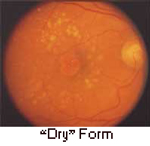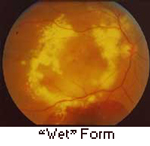AGE-RELATED MACULAR DEGENERATION
The disease affects the part of the retina called the macula, which is responsible for central vision. Vision loss from AMD typically occurs gradually and can affect both eyes at different rates. Even though macular degeneration can cause visual impairment, the disease usually does not cause peripheral (side) vision loss or lead to total blindness.
Types : The two common types of macular degeneration are "dry" and "wet."

"Dry form" : The most common form of macular degeneration is caused by aging and thinning of the tissues of the macula. It develops slowly and usually causes mild vision loss. As this form of the disease develops, people often notice a dimming of vision while reading.

"Wet form" : Rare, and more severe. The wet form of the disease causes new blood vessels to grow beneath the retina, which leak fluid and blood, often creating a large blind spot in the center of the visual field. May progress rapidly causing significant central vision loss.
The causes of macular degeneration are not completely understood. Some scientists believe heredity may play a part, as well as UV light exposure, nutrition, and cigarette smoking. Studies are ongoing.
SYMPTOMS :
- A dark area or a "white-out" appears in the center of vision.
- Blurred or fuzzy vision.
- Color perception fades or changes.
- Straight lines, such as sentences on a page or telephone poles, appear wavy or distorted.
TREATMENT :
"Dry form" - There is no proven effective treatment for dry macular degneraation. Low vision rehabilitation can help those with significant vision loss to maintain excellent quality of life. High dose antioxidant vitamin therapy may help prevent some patients with dry macular degeneration from developing the wet form of the disease. "Wet form" - a variety of therapies are available for we macular degeneration; including intravitreal injection, photodynamic therapy, and rarely laser photocoagulation.